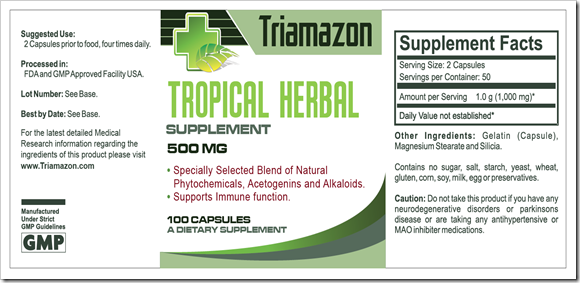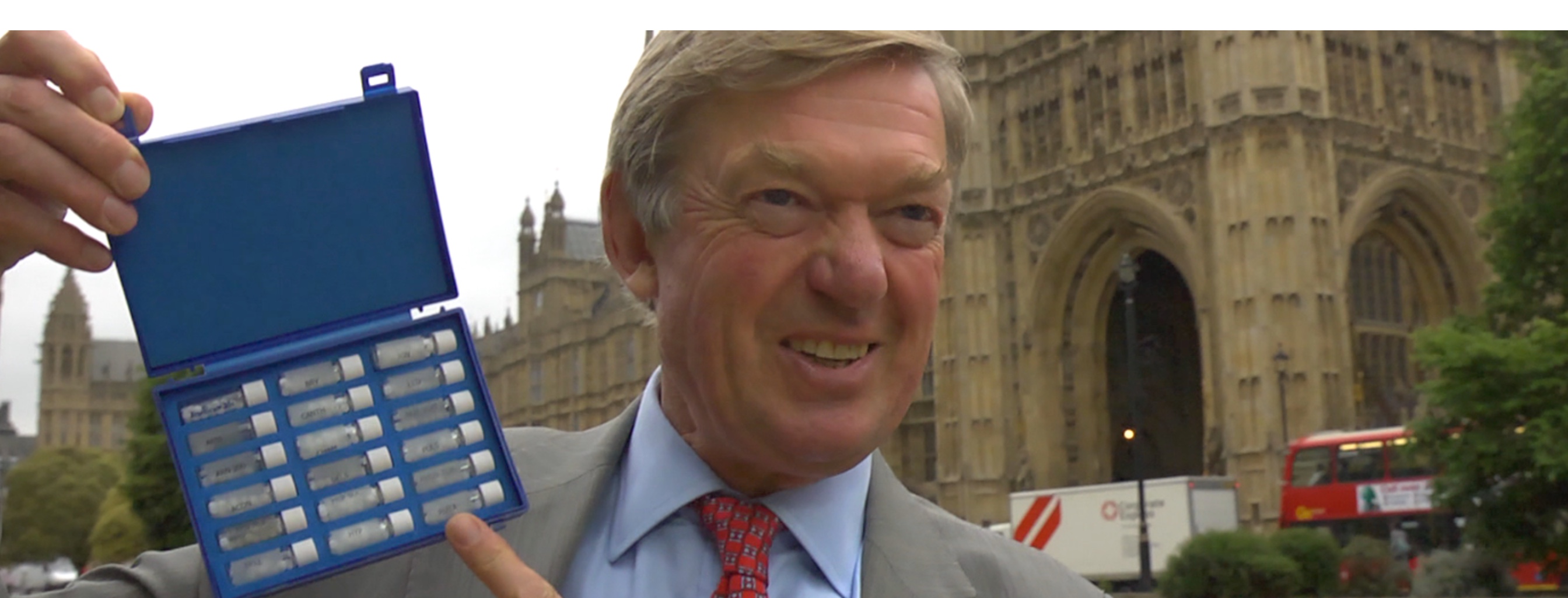The Finchley Clinic, Triamazon and the Law.
There is nothing too remarkable about the Finchley Clinic in London. Apart that it is not really a clinic as you might understand the word. It is run by a chap called Mark Lester who apparently used to offer a number of questionable alternative medicine therapies, including ozone therapy, bowen therapy and very unorthodox tests such as Rife machine and something called electro-crystal therapy. These days, the Finchley Clinic just runs an online web store selling vitamin pills and supplements. There is nothing unusual there: it is much like the dozens of other similar pill sites you can find.
One thing that does appear to be unique is it is the only place I can find that sells a pill called Triamazon. The site claims that Triamazon is a “a specialised formulated pharmaceuticaly graded selection of plant derived phytochemicals, alkaloids and acetogenins”. We are warned that, “It is not provided to treat, cure or prevent any disease, and should not be used to replace any medical treatment which has been recommended or is being received.” One has to wonder just what this product is for.
But again, sites selling pills and not making any specific claims for them again is not unusual. Triamazon is just a food supplement after all.
What is a little unusual is that the sole importer and supplier of Triamazon that I know of has this week pleaded guilty in Manchester’s Minshull Street Crown Court of importing, possession, supply and sale of a medicinal product without a license. Andrew Harris had stood trial after originally pleading not guilty, but after a few days in court and just before he was about to give evidence, he changed his plea saying, “Due to a technicality in law pointed out to me, I now plead guilty.” Presumably that technicality was that he was guilty.
Andrew Harris’s appearance in court was not too unusual as well in that a few years ago he was found guilty under the Cancer Act of 1939 after advertising Triamazon as a cancer cure. Harris was arrested after dawn raids on his address following investigation by Trading Standards and the MHRA that he was selling Triamazon from his own web sites, including www.thiskillscancer.com and triamazon.com, and making unsubstantiated claims that these pills could cure cancer. He was given a two year conditional discharge and ordered to pay costs of £350.
Since then, his site Triamazon.com has not been offering the pills for sale. Instead, the site has been making all sorts of wild claims for the health benefits of the product and appeals for the Cancer Act to be repealed. Visitors are directed to the Finchley clinic if they want to buy some. This arrangement means that everything now is pretty much legal. Harris is perfectly entitled to have a web site and spout any sort of nonsense about Triamazon he wants to. The Finchley Clinic is perfectly entitled to sell this ‘food supplement’ as long as it is not making medicinal claims.
Harris was not on trial because of what he says on his web site. It looks like a MRHA officer telephoned him directly and asked to buy some pills. He confirmed who he was, and supplied the pills with his return address on it. If Mr Harris had been ever so slightly more on the ball and refused to sell the product, but instead said he knew a site that did sell Triamazon, then it is unlikely that he would now find himself facing sentencing in a couple of weeks.
Before we move on it might be worth looking quickly at what Triamazon is. It looks like the pills are just a branded form of graviola, also known as Soursop – a tropical evergreen plant with big pawpaw like fruit. There are all sorts of claims out there on the web for the miraculous properties of graviola – and you can find tubs of pills derived from the fruit for a few quid. Mr Harris was selling his branded version for £250, with customers ‘requiring’ a course of two tubs.
Cancer Research UK tell us that there has been some test tube work on graviola showing that it can kill cancer cells. No human testing has ever been done. As such, graviola joins a long line of substances that can kill cancer cells in a test tube: you can tip vodka on cancer cells and they will die – this does not mean vodka is a cure for cancer. Cancer Research UK says, “We do not support the use of graviola to treat cancer. Our advice is to be very cautious about believing information or paying for any type of alternative cancer therapy on the internet”. They also warn that graviola has been shown to cause nerve damage and lead to symptoms like Parkinson’s disease.
The Finchley Clinic helpfully tells customers that they are “not associated with any company, web site or individual making medical claims of any description for this product.” This statement is somewhat undermined when they go on to state that they have been in contact with the suppliers to ask why it is so expensive. Quite fairly, they say,
It is not our intention to exploit customers, and please rest assured that we do not supply Triamazon with artificially raised margins compared with our other products.
Unfortunately our attempts to find out why Triamazon is so dear have not been terribly successful. We did ask the supplier, but we didn’t get an especially helpful reply. Their main reply was to advise us to ask the drug companies why their drugs are so expensive (which was a perfectly legitimate question, but somewhat off the subject), along with this link to an article about the pharmaceutical companies unethical practices…
There then is a link to a Daily Mail article.
The clinic shows the product label which clearly directs punters back to Triamazon.com if they want to know about the medical research information regarding the product.
None of this is unusual. And perhaps it is quite unfair to focus on this example as the whole vitamin and food supplement pill is based on the same simple trick: separate web sites for medical claims and sales. Mainstream pill and potion sellers like Patrick Holford and Gillian McKeith have their own web sites, members clubs, books and conferences that can quite legitimately make all sorts of health claims, but do not attempt to sell products to you. Other channels do that – and these sites and stores do not make health claims. It is not just characters like these. The big High Street chains thrive off the same practice, but here they tend to rely on enough wild information being out of the web generically for various products to be sold. Chains like Boots or Holland and Barrett do not need to make fantastical claims for food supplements when the web is choc-a-bloc with nonsense. These companies, they say, are just meeting a demand: a demand often driven by fantastical and unevidenced claims from crank web sites. Julian Graves were selling apricot kernels recently – a bitter and poisonous seed – and directing customers to ‘look on the web’ to find out what claims were being made for them. In this case, apricot kernels are touted as a cancer cure despite their very poisonous nature. These are not small companies, but part of multi-billion dollar multinationals.
By ensuring claims are separate from sales, legal issues can be side stepped. Despite the fact that so many so called food supplements appear to have no specific benefits outside of the whacky world of the web, companies like Boots and Holland & Barrett are quite happy to have shelves and shelves of the useless tubs lined up. To me, the issue looks like quite a difficult one to solve. For example, if you sell Vitamin C in quantities of 50mg, then they can be sold quite legitimately as a food supplement for people who may not be getting enough got whatever reason. But sell Vitamin C in 1000mg and higher and people will be just producing expensive urine with it. High dose vitamin C has moved into quack claim territory and is only really being sold when people are misinformed.
New EU laws may well make such large dose vitamin pills hard to sell. But products like Triamazon are not vitamins. I think what may be required is for the onus to be on sellers to demonstrate that their products can be used as genuine food supplements, for that is how they are being sold. At the moment, the only reason someone might buy a product like Triamazon is if they have been misled into believing that it can help treat cancer – it is not a food supplement, and no-one will buy it as such, despite it being sold as one.
This too would go for a whole host of products currently lining shelves in the High Street, from shark cartilage pills to megadose vitamins.
Trading Standards laws already in place should be sufficient to enforce this. What is lacking at the moment is awareness and training within Trading Standards groups of the issues and how to assess medical claims. If Mr Harris had not made his telephone sales slip up, then there may well have been many people buying these expensive pills under the false hope that they could cure terminal illnesses.









4 comments